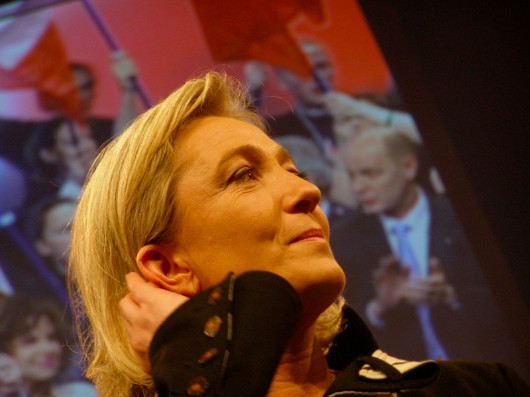The Front National and the "Religion" of Ethnic Nationalism
The radical right is increasingly mainstream throughout Europe
 The radical right is increasingly mainstream throughout Europe. Sarah de Lange notes how, since the 1990s, radical right-wing parties have joined coalition governments in Austria, Denmark, Estonia, Italy, the Netherlands, Norway, Poland, Romania, and Slovakia. The UK Independence Party played a key role in 2016’s Brexit result. That same year, the anti-immigrant Freedom Party of Austria under Norbert Hofer finished second in the Austrian presidential elections with a whopping 46% of the popular vote. Geert Wilders, a Dutch nationalist firebrand who once compared the Qur’an to Mein Kampf, finished second in Holland’s recent parliamentary elections. Farther east, a radical nationalist named Viktor Orbán is the Prime Minister of Hungary.
The radical right is increasingly mainstream throughout Europe. Sarah de Lange notes how, since the 1990s, radical right-wing parties have joined coalition governments in Austria, Denmark, Estonia, Italy, the Netherlands, Norway, Poland, Romania, and Slovakia. The UK Independence Party played a key role in 2016’s Brexit result. That same year, the anti-immigrant Freedom Party of Austria under Norbert Hofer finished second in the Austrian presidential elections with a whopping 46% of the popular vote. Geert Wilders, a Dutch nationalist firebrand who once compared the Qur’an to Mein Kampf, finished second in Holland’s recent parliamentary elections. Farther east, a radical nationalist named Viktor Orbán is the Prime Minister of Hungary.
Founded in 1972, France’s Front National (FN) is an inspiration for the entire radical right, having invented the electorally successful formula that holds immigrants (in particular Muslims) responsible for all the ills of the nation, from unemployment to an overburdened welfare state to terrorism. The FN, too, is on the rise. In one poll ahead of the upcoming French presidential elections, The Telegraph had the FN’s Marine Le Pen in first place with 25.3% of the popular vote. Most polls predict she will lose in the second round.
Le Pen’s rise to political prominence comes as little surprise. Her father, Jean-Marie Le Pen, stunned the French political scene when he reached the second round of the 2002 presidential elections. By 2015, the elder Le Pen was expelled from the FN because of his controversial remarks on the Holocaust and persistent anti-Semitism, which made it harder for his daughter to create a “new,” more “respectable” radical right. (Ironically, Marine Le Pen herself recently claimed that the French state was not responsible for the 1942 roundup of 13,000 Jews who were then sent to Nazi death camps.)
The FN has steadily become more electorally viable by abandoning its connections to the terrorism of the “old” radical right, focusing instead on populist “direct democracy” and a “cultural war” against liberal-left political and cultural elites—the latter strategy inherited from the French intellectual Nouvelle Droite (ND). For it was ND leader Alain de Benoist who first advanced a “right-wing Gramscianism”—seizing the “laboratories of thought”—as prelude to the conquest of the state. Thus Bernard-Henri Lévy, a critic of the FN, has argued that Marine Le Pen represents “a far right with a human face.”
Is the FN really Catholic?
Whereas some critics of the FN, such as Nigel Copsey, have focused on whether the FN represents a threat to democracy or a new type of fascism, Cas Mudde has shown that the FN is populist, advancing the “voice of the people” over established parties. Yet the FN’s views on religion have not been sufficiently explored. Is the FN really Catholic, or are its anti-immigrant politics incompatible with Christian universalism?
The radical right’s uneasy relationship with religion has a long history. Joseph de Maistre, a 19th-century French counter-revolutionary thinker, wanted to restore the power of the Church and even valorized the Inquisition. Charles Maurras, following the infamous Dreyfus Affair, joined the ultranationalist and monarchist Action Française (AF) founded by Maurice Pujo and Henri Vaugeois in 1898. Although he was an agnostic, Maurras led a Catholic revival in France. On December 29, 1926, Pope Pius XI condemned the AF. Its newspaper was banned by the Catholic Church, and by March 8, 1927, AF members were prohibited from receiving the sacraments.
While the FN historically courted Catholic traditionalists, the ND—which rejects the Judeo-Christian tradition as the model for egalitarian worldviews such as liberalism, socialism, and multiculturalism, and instead harkens back to Europe’s pagan and more ethnically homogeneous past—remains one of its factions. Peter Davies argues that the FN is not particularly popular among regular churchgoers, while he also suggests that Clovis and Joan of Arc were selected as the FN’s political icons because of their heroism and Catholicness. Jean-Marie and Marine Le Pen are both practicing Catholics, but the latter has criticized the Church’s “meddling” in elections and its criticism of the FN’s stance on immigrants and refugees. As the Harvard Divinity School Religious Literacy Project observes, the FN has often taken socially conservative positions against homosexuality, abortion, contraception, and divorce, even as Marine Le Pen has softened her own positions on abortion and the death penalty to challenge her niece Marion Maréchal-Le Pen, the FN’s rising star.
The supposed “clash of civilizations” between Christianity and Islam also plays into the FN’s political calculus. Islam is viewed as incompatible with French values and the secular state as well as weakening France’s Catholic identity. Caroline Fourest and Fiammetta Venner point out that the FN, under the influence of former ND number two Guillaume Faye, identifies “Islamicization” as “the new peril.” Despite Le Pen’s claims to distinguish between Islam and Islamism, her formula is simple: Islam = immigration = “Occupation of France.” She has openly compared demographic changes in French society to the Nazi occupation. Islam and immigrants are “un-French.” These Muslim immigrants “occupy” France with their values, and lead the political class toward a politics of multicultural tolerance, thereby diluting the ethnic conception of the nation. Moreover, the FN muddies the historical record by claiming that Muslim immigration to France is worse than the pro-Nazi Vichy regime—a dubious analogy.
Is Marine Le Pen, then, a modern-day Maurras? Maurras saw religion in largely pragmatic terms as a mechanism to unify the nation. For Le Pen, French national identity is informed by its Catholicism. Catholicism acts as an antidote to the spread of Islam and in particular radical Islamism, perhaps the key enemy of the French radical right. However, ethnic nationalism is the FN’s real “political religion.”
The “religion” of ethnic nationalism
According to the Italian political theorist Emilio Gentile, in our more secular age we have witnessed a “sacralization of politics.” Politics took on a sacred aura with the democratic revolutions of the late 18th century (i.e., the American Revolution of 1776 and French Revolution of 1789). Prerequisites for the sacralization of politics include secularization, modernization, the independence of politics from established religions, and the separation of church and state. The “sacralization of politics” is in part an affirmation of the principle of state sovereignty vis-à-vis the church, and “the glorification of the nation as the supreme ideal entity to which the citizen owes loyalty, devotion, and commitment.”
For the FN and Le Pen, there is no question that the nation is “sacred” in this sense. In short, the FN’s true faith is not Catholicism, but rather the French nation. It is therefore not surprising that Le Pen campaigned on threatening to remove the citizenship of Israeli-French dual nationals. In so doing, she advanced the popular historical prejudice that Jews are disloyal, incapable of an absolute “glorification of the nation.”
Furthermore, as Hans Kohn would argue, the FN privileges ethnic over more liberal, civic variants of nationalism. The FN’s nationalism differs from that of the mainstream right in its radicalism, its obsession with the dominance of the main ethnic group, and its longing for a homogeneous nation and state. It is also populist in tone, indebted to direct rather than representative democracy. Its relationship to fascism, Nazism, collaborationist regimes, and the Holocaust is sometimes ambiguous.
In the FN’s 2011 program, the party called for reforms to automatic acquisition of French nationality if one’s father or mother is French. The party also made acquisition of French nationality contingent on “good conduct” (that is, no criminal record) and one’s ability to integrate into French society. In essence, the FN wants to promote a more ethnically “pure” France.
The 2016 electoral program of the FN consists of leading sections on “the authority of the state” and “the future of the nation”—both connected to the party’s primordial nationalist concerns. The “immigration” subsection under “the authority of the state” declares that “immigration must be stopped” and French national identity “reinforced.” Immigration is condemned for three reasons: (1) it is not a “humanist project,” but an “arm in the service of big capital”; (2) it is a burden on “the national community”; and (3) it causes problems for the Republic like ghettos, inter-ethnic conflicts, and ethnic communitarianism, which poisons “national cohesion.” Multiculturalism is a “killer” of the ethnic conception of the French nation. The FN’s anti-immigrant, anti-Muslim, and at times anti-Semitic proclamations should all be understood as expressions of its authentic “political religion”—radical ethnic nationalism.
Resources
- Agence-France Presse. “Marine Le Pen denies French role in wartime roundup of Paris Jews.” The Guardian. April 9, 2017.
- Copsey, Nigel. “‘Fascism... but with an open mind’: Reflections on the Contemporary Far Right in (Western) Europe; First NIOD Lecture on Fascism – Amsterdam – 25 April 2013.” Fascism, Vol. 2, No. 1 (2013): 1-17.
- Davies, Peter. “The Front National and Catholicism: from intégrisme to Joan of Arc and Clovis.” Religion Compass, Vol. 4, No. 9 (September 2010): 576–587.
- De Lange, Sarah L. “Radical Right-Wing Parties in Office.” In U. Backes and P. Moreau, eds., Right-Wing Extremism in Europe: Current Trends and Perspectives. Vandenhoeck and Ruprecht, 2012.
- Fourest, Caroline, and Fiammetta Venner. Marine Le Pen. Bernard Grasset, 2011.
- “Le Front National.” Harvard Divinity School Religious Literacy Project. Accessed April 16, 2017.
- Gentile, Emilio. Politics as Religion. Trans. George Staunton. Princeton University Press, 2006.
- Kohn, Hans. The Idea of Nationalism: A Study in Its Origins and Background. Transaction, 2008.
- Lévy, Bernard-Henry. “Maintenant, Marine Le Pen.” Le Point. March 25, 2010.
- Mudde, Cas. Populist Radical Right Parties in Europe. Cambridge University Press, 2007.
- Official site of the Front National. Accessed April 16, 2017.
Image: Marine Le Pen | Photo Credit: staffpresi_esj/Flickr via Wikimedia Commons (cc)
 Author, Tamir Bar-On, is a researcher and professor at Tec de Monterrey, Campus Querétaro, Mexico. He is the author of Where Have All the Fascists Gone? (Routledge, 2007), Rethinking the French New Right: Alternatives to Modernity (Routledge, 2013), The World through Soccer: The Cultural Impact of a Global Sport (Rowman & Littlefield, 2014), and Beyond Soccer: International Relations and Politics as Seen through the Beautiful Game (Rowman & Littlefield, 2017). Author, Tamir Bar-On, is a researcher and professor at Tec de Monterrey, Campus Querétaro, Mexico. He is the author of Where Have All the Fascists Gone? (Routledge, 2007), Rethinking the French New Right: Alternatives to Modernity (Routledge, 2013), The World through Soccer: The Cultural Impact of a Global Sport (Rowman & Littlefield, 2014), and Beyond Soccer: International Relations and Politics as Seen through the Beautiful Game (Rowman & Littlefield, 2017). |
Sightings is edited by Brett Colasacco, a PhD candidate in Religion, Literature, and Visual Culture at the University of Chicago Divinity School. Subscribe here to receive Sightings in your inbox twice a week. You can also follow us on Facebook and Twitter.

